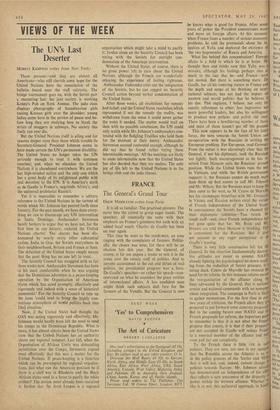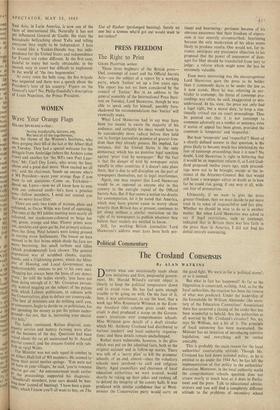FRANCE The General's Grand Tour
DREW MIDDLETON writes from Paris:
It is all so familiar. The practised gestures. The move into the crowd to grasp eager hands. The speeches; all essentially the same with their emphasis on France's greatness but each with an added local touch. Charles de Gaulle has been on tour again.
This time he went to the south-west, an area ringing with the complaints of farmers. Politic- ally, the choice was wise, for there will be an election late this year. But the General, of course, is far too august a leader to mix it in the arena over the sweaty stuff of politics. And to anyone accustomed to the cut and thfust of real politics, the presidential progress was a bore. De Gaulle's speeches—or rather his speech—con- centrated on what he considers the great verities of international affairs. A less confident man might think such subjects dull fare for the farmers of the Vendde. But the General is sure
he knows what is good for France. After seven years of power the President concentrates more and more on foreign affairs. At this moment. when France faces a number of serious economic problems. he told the provincials about the in iquities of Yalta and deplored the existence of `the two hegemonies' of Russia and America.
What lies behind this concentration? Foreign affairs is a field in which he is at home. He thought then and thinks now that Yalta ■■:1-, a mistake, although his feelings perhaps o N.s c as much to the fact that he--and France ‘N ere not invited. But there is something more. De Gaulle. for all his towering stature in France and the depth and scope of his thinking on inter- national subjects, has not had the impact on western and world politics that he believes is his due. This explains, I believe, not only his caustic references to other, less impressive but more powerful leaders, but also his willingness to produce new policies and polish old ones There have been a bewildering number of these and most of them haven't got off the ground.
This now appears to be the fate of his latest foray, the turn towards the Soviet Union and co-operation with the Russians in settling the European problem. For European, read German From the outset it was alarmingly clear that the General, if not his diplomats, took the Russians too lightly. Such encouragement as he has re ceived from Moscow suits the Russians' present position. While the United States runs the war in Vietnam, and while the British government supports it, the Russians cannot do much more than think up bad names to call Mr. Johnson and Mr. Wilson. But the Russians want to keep the lines open to the west, so M. Couve de Murville has his champagne breakfast with Mr. Gromyk0 in Vienna and Russian writers extol the virtues of French independence of the United States' In consequence the Soviets have a channel for their diplomatic' subtleties—Tass retails the tough stuff—and, since French independence 110 not gone quite that far, Mr. Rusk and Mr• Stewart are told what Moscow is thinking. Thi' is convenient for the Russians. But it doe` not amount to any eager acceptance of de Gaulle's wooing.
There is very little constructive left for the General. In this situation fundamentally destine' tive attitudes are easier to assume. NATO. already fighting the psychological let-down result' ing from the reduction of Soviet pressure, is 3 sitting duck. Couve de Murville has stressed the need for its reform. In this instance reform mean` the reorganisation of the alliance along IV, lines advocated by the General, that is national armies and national commands with no nonsense about integration. The campaign in Paris is likel) to gather momentum. For the first time in over two years of criticism, the French allow they are prepared to put forward some concrete proposals'• But in the coming furore over NATO and the French proposals for reform, the important point to remember is that it is not what the French propose that counts, it is that if their proposal' are not accepted de Gaulle will reduce France to a nominal member of the alliance and mat', even pull her out completely. To the French there is little risk in such policies. They are sure, too sure in my opinion. that the Republic across the Atlantic is so set in the policy grooves of the 'forties and Vile' that it will not, and, indeed, cannot change it5 policies towards Europe. Mr. Johnson alrearlf. has demonstrated an independence of his allte; that reflects a sure awareness of the disparity ot power within the western alliance. Whether like it or not, this unilateral approach, in South', East Asia, in Latin America, is now one of the facts of international life. Naturally it has not Yet influenced General de Gaulle. He visits the boondocks bellyaching about Yalta and telling everyone they ought to be independent. I hate to sound like a Yankee-Doodle boy, but inde- pendence for the United States and independence for France are rather different. In the first case, painful to many but easily, obtainable; in the second, easy to assert but difficult to implement. In the world of `the two hegemonies.'
`At every town the bells rang, the fire brigade was inspected and there was a speech about the President's love of his country.' Figaro on the General's tour? No, Philip Guedalla's description of Louis Napoleon, the Prince President.



































 Previous page
Previous page